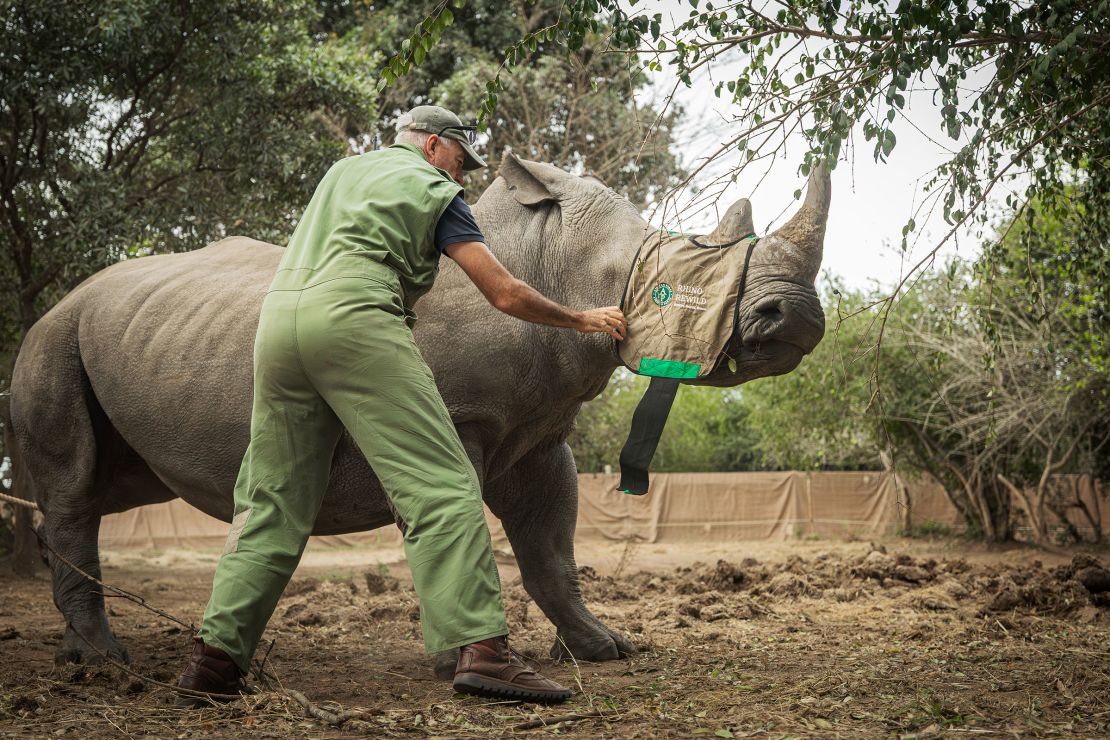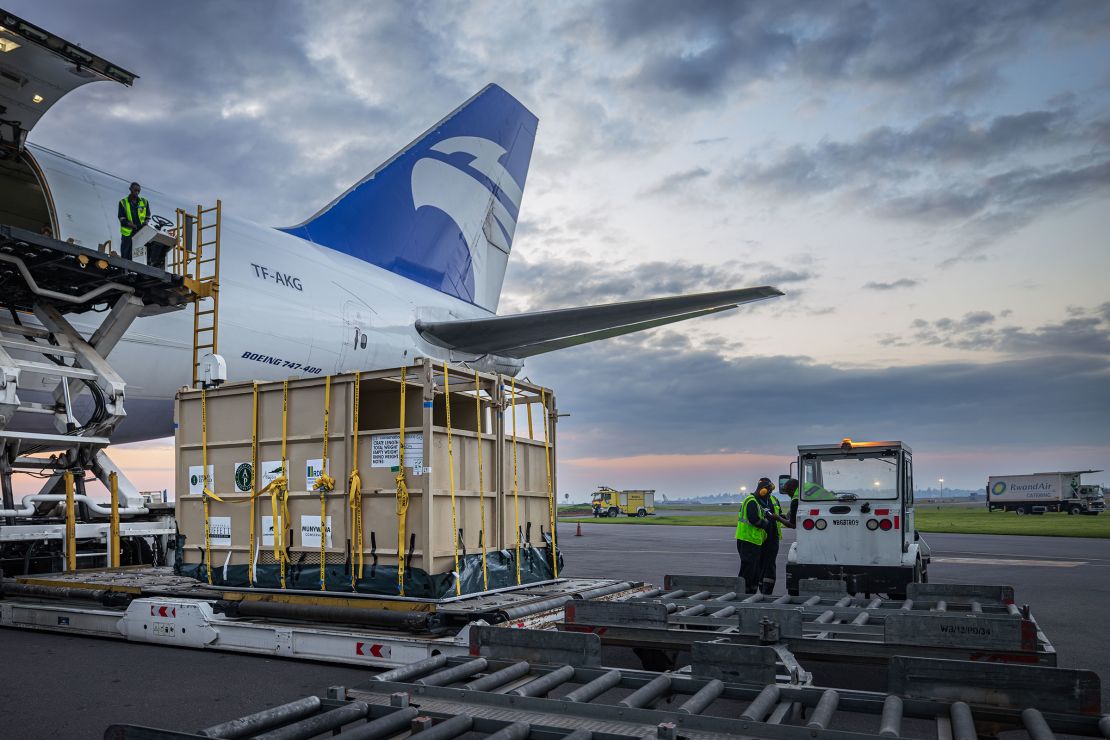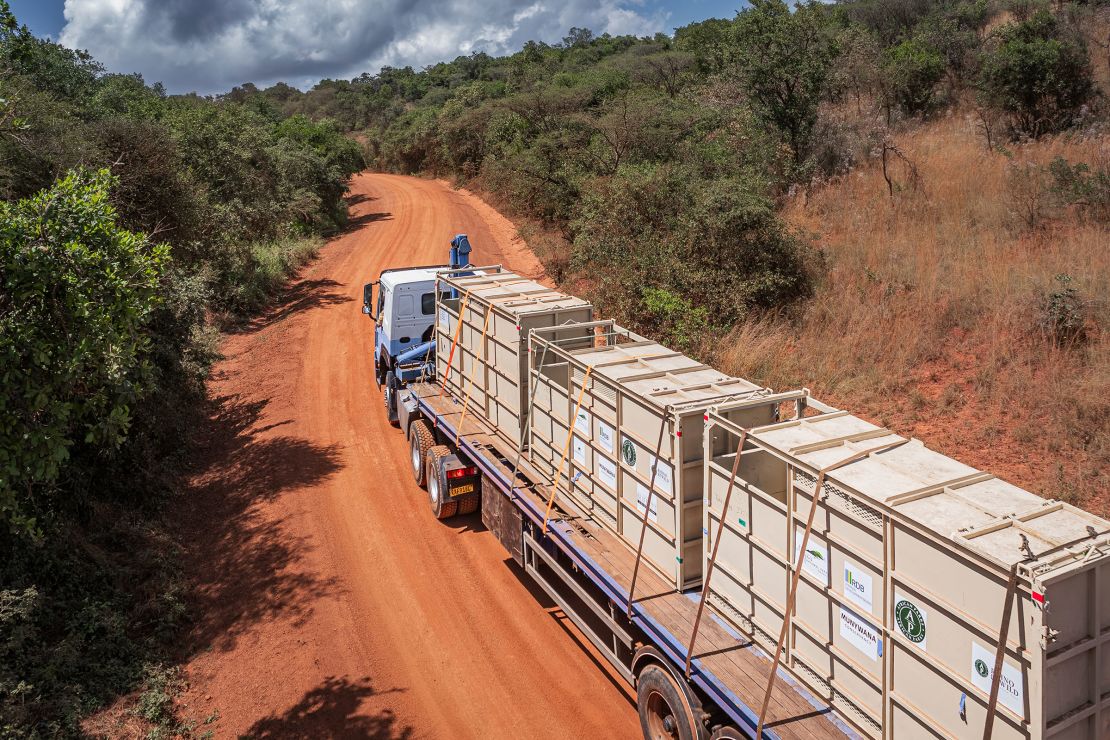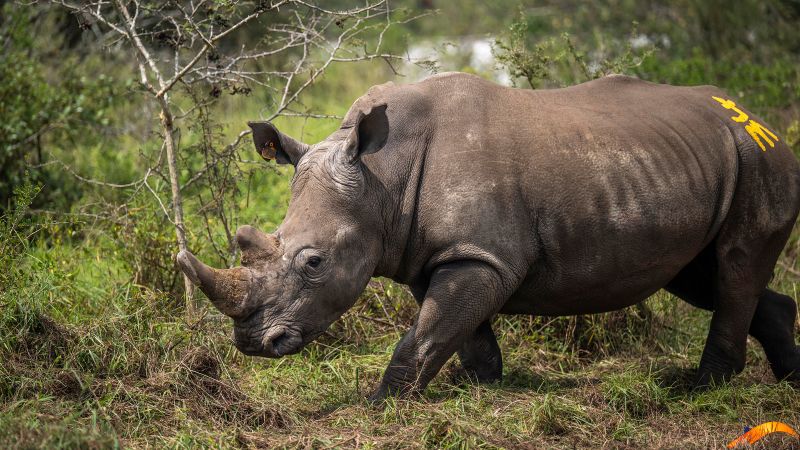Editor’s Note: Call to Earth is a CNN editorial series committed to reporting on the environmental challenges facing our planet, together with the solutions. Rolex’s Perpetual Planet Initiative has partnered with CNN to drive awareness and education around key sustainability issues and to inspire positive action.
CNN
—
Transporting the world’s second largest land mammal halfway across the second largest continent isn’t exactly easy.
But in a 3,400-kilometer (2,100-mile) journey that involved crates, cranes, trucks, and a Boeing 747, 70 captive bred southern white rhinos were moved from South Africa to Rwanda’s Akagera National Park in early June as part of an initiative to “rewild” them.
“Moving 70 rhinos across the continent is high-risk stuff,” Martin Rickelton, the head of translocations for African Parks, told CNN. So far, the animals appear to be doing well in their new home. “All reports are good,” Rickelton adds.
The creatures, which can weigh over 2,000 kilograms (more than 4,000 pounds), originated from a controversial breeding program started in the 1990s by property developer John Hume.
Hume, who spent years lobbying for the legalization of the rhino horn trade, amassed stockpiles of horn, obtained by trimming them without harming the animals, with the aim of flooding the market to driver poachers out of business and to fund conservation efforts.
But he ran out of money, and with the horn trade still banned under international law, he put the rhinos up for sale in 2023. He told Agence France-Presse (AFP) at the time that he’d spent around $150 million on the project – with surveillance being the largest cost. “I’m left with nothing except 2,000 rhinos and 8,000 hectares (20,000 acres) of land.”
He didn’t receive a single bid. African Parks — a conservation nonprofit that manages 23 protected areas across the continent — stepped in to acquire for an undisclosed sum what was the largest rhino captive breeding operation in the world, with plans to “rewild” the animals over 10 years.
The translocation marked the first cross-continental move for African Parks’ Rhino Rewild initiative.
“It’s a very important milestone,” says Taylor Tench, a senior wildlife policy analyst at the nonprofit Environmental Investigation Agency US, who wasn’t involved in the relocation. “This is definitely a big development with respect to African Parks’ efforts.”
Today, there remain only about 17,000 southern white rhinos in Africa and they’re classified as “near threatened” on the International Union for Conservation of Nature’s Red List. That means the 2,000 southern white rhinos that African Parks bought, and plans to spread around the continent, comprise more than 10% of the remaining population.
Although the international trade of rhino horn has been banned under the Convention on International Trade in Endangered Species (CITES) since 1977, demand from consumers in Asia who see it as a status symbol, or falsely believe it can cure ailments ranging from hangovers to cancer, is still driving poaching.

Poachers sometimes kill a rhino outright, or tranquilize it before cutting off its horn, sometimes hacking off a large portion of the animal’s face, leaving it bleeding to death.
In South Africa, where the majority of the population lives, 420 rhinos were poached in 2024. More than 100 were killed in the first three months of this year.
Tench says that rhino poaching was rampant in the continent from 2012 to 2015, and a “lot has been accomplished since then.” He added that Kenya lost no rhinos last year and that poaching has dropped significantly in Zimbabwe. Today, poaching is mostly concentrated in South Africa and Namibia, he says.
To better address the issue, Tench says more government resources should be dedicated to addressing the organized criminal networks behind the poaching and international trading of rhino horn, and to increased international cooperation.
Rickelton says there are a number of future relocation projects in various stages of discussion and planning. He adds that a strong framework is in place to ensure the locations that receive the rhinos provide a suitable habitat, security to keep the animals safe, and enough funding to care for them.

The move to Akagera National Park took more than a year and a half of planning and approvals. And the cost of moving each rhino, including three years of monitoring and management afterwards, is about $50,000 (the move was backed by the Howard G. Buffet Foundation).
The animals were first moved from the breeding program facility to the South African private game reserve Munywana Conservancy, to expose them to conditions more like Akagera. Then, the rhinos were loaded into individual steel crates, driven to an airport in Durban, South Africa, and carefully loaded by crane onto a Boeing 747.
After arrival in Kigali, Rwanda, the rhinos made the final leg of their journey by road. Now, the rhinos need to adapt to their new environment. They’ll be monitored by a veterinary team for several weeks.

Measures like a canine unit to reduce poaching are in place in Akagera, which has reduced poaching to “near zero” levels, according to the park.
There’s reason for optimism. In 2021, African Parks moved 30 rhinos to Akagera from a private game reserve in South Africa. Since, they’ve had 11 offspring. With the addition of 70 more rhinos, “we’ve now established a genetically viable herd of rhino,” says Rickelton.
He says that seeing the rhinos emerge from their crates at the end of the journey “makes months and months of really hard work and frustration and challenges really worth it.” Rickelton adds: “It’s a story of hope in a world of not too much positive.”

